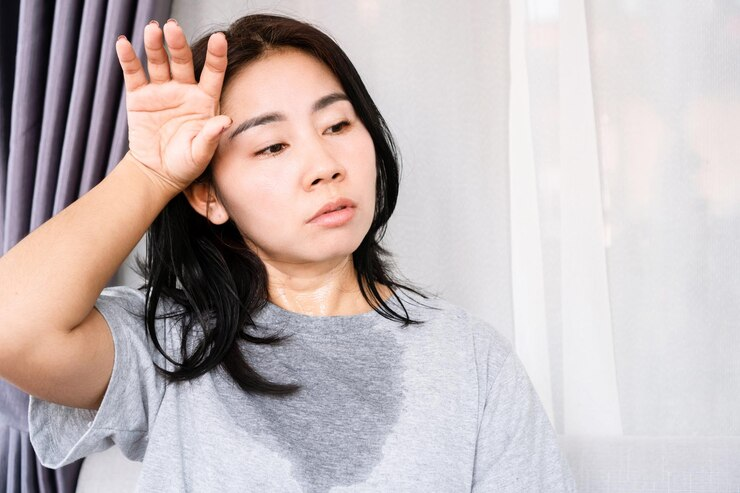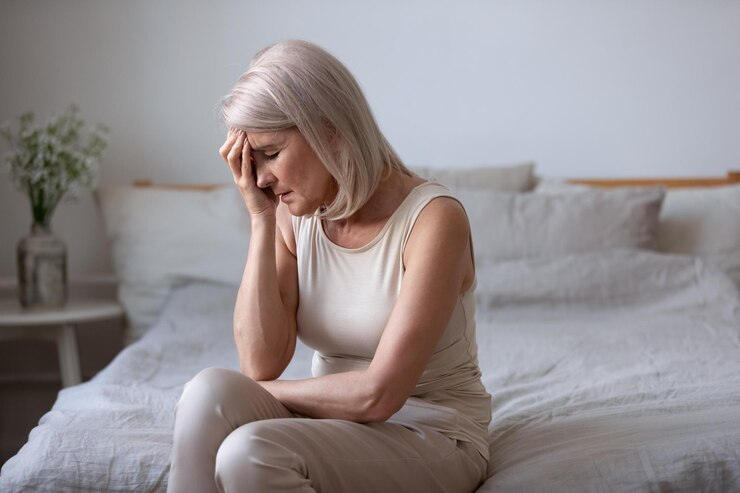What are the 34 symptoms of Menopause?



Marking the end of her reproductive years, the mid-40s and mid-50s are significant transitioning years in a woman’s life. Labelled as Menopause, this transition period is characterized by several changes within a woman’s body. Women often have to cope with several physical, emotional, mental, and hormonal changes, along with catering to the needs of their daily life.
Menopause is basically a period of twelve consecutive months in which a woman does not have her menstrual periods. Her ovaries have permanently stopped releasing eggs and no longer produce optimum levels of reproductive hormones.
Around 1.5 million middle-aged women undergo menopause each year, experiencing menopausal symptoms around a decade before menopause occurs.
Perimenopause is the transitional period before menopause, during which a woman experiences symptoms because of fluctuating hormone levels and the decline in functionally active ovaries. This period may last for an average of 8 to 14 years.
Post-menopause is the period after menopause when a woman no longer ovulates. The oestrogen hormones are usually at an all-time low and a woman is more prone to cardiovascular diseases and osteoporosis post-menopause.
Women experience a wide range of symptoms during their menopausal transition. More than 30 different menopause symptoms have been known to occur during the years leading to menopause.
Some of the commonly occurring menopause symptoms include:

One of the most common symptoms of menopause, hot flushes is characterized by excessive sweating, a feeling of heat on the skin, redness, and a flushed face.
Hot flushes experienced during sleep are termed night sweats. Night sweats are a common cause of disturbed sleep during menopause.
Tenderness of the breast experienced during menopause may often differ from normal cyclic breast pain that occurs a few days before every period. Many women complain of breast soreness and burning sensation in either one or both breasts.
Declining oestrogen levels affect the body's health of muscles, joints, and bones. The oestrogen hormone plays a vital role in maintaining the connective tissue of the joints. Reduced oestrogen results in joint and muscle aches, with many women complaining of frequent pain in the knee joint and hip area. Even small joints of the fingers and toes tend to become painful.
With declining active ovarian follicles and fluctuating hormones, your menstrual period may often be delayed, or sometimes you may skip your periods for a month or two. Menstrual flow may become lighter or heavier. Some cycles may have a short or even longer menstrual period.

Hormonal fluctuations, hot flashes, and disturbed sleep are often responsible for the mood changes that accompany menopause. Most women experience symptoms of anxiety, depression, and irritability. Huge changes in the life of middle-aged women, such as children moving out of home and caring for elderly parents, also tend to negatively impact one’s mental and emotional health.
Weight Gain
Headache
Disturbed Sleep or insomnia
Problems related to digestion
Nausea
Dizzy spells
Bloating
Brain fog
Brittle nails
Itchy skin
Urinary incontinence
Vaginal dryness
Increased Urinary tract infection
Increased Vaginal infection
Decreased libido
Premenstrual symptoms (PMS) tend to get worse
Dry eyes and mouth
Changes in muscle and fat proportion in the body
Fatigue
Forgetfulness
Difficulty concentrating
Increased hair fall
Palpitations
Increased bad cholesterol (LDL)
Decreased good cholesterol (HDL)
Decreased chances of conceiving
Irregular heartbeat
Hypertension
Stress incontinence
Panic disorder
Osteoporosis
Although the menopause transition brings along with a wide range of symptoms, they can be managed with simple and effective changes in lifestyle and diet. Consulting your primary care physician for treatment options specific to your symptoms is always a great idea. Your doctor may prescribe pain relief medications and supplements or, in some cases, may also recommend hormone replacement therapy. Dietary supplements, yoga, physical exercises, and adequate sleep will make your journey through menopause much easier.
If you would like to learn more about menopause, read through our Menopause and HRT information page here.









